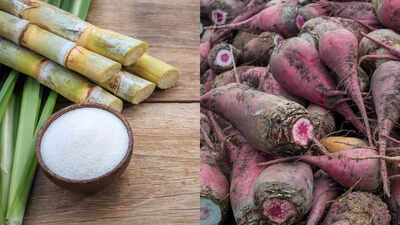The Great Debate: Sugar Beet Vs Sugar Cane - Which Is the Superior Selection for Sugar?
The debate over sugar beet versus sugar cane as the recommended sweetener entails numerous essential aspects. Each deals distinct advantages and difficulties regarding manufacturing, taste, and wellness effects. While sugar beet might interest those focusing on sustainability, sugar cane has its very own social and culinary value. As customers become more mindful of their choices, the question continues to be: which sugar absolutely sticks out in today's market?
The Beginnings of Sugar Beet and Sugar Cane
Although sugar cane has been cultivated for countless years, mainly in tropical regions, sugar beet emerged as a significant option in cooler climates during the 18th century. Sugar cane, belonging to Southeast Asia, was initial tamed around 8000 BCE and spread out worldwide via profession and expedition. Its high sucrose material made it a useful plant, resulting in considerable vineyards in areas like the Caribbean and Brazil.
In contrast, sugar beet was initial cultivated in the Mediterranean around the 18th century, particularly obtaining grip in Europe as an action to sugar cane scarcities. The plant thrives in warm environments, making it ideal for regions with chillier climate. The exploration that sugar can be drawn out from beet origins reinvented sugar manufacturing, specifically throughout the Napoleonic Wars when profession constraints limited cane sugar gain access to. The increase of sugar beet cultivation marked a turning point in the history of sweeteners, providing a neighborhood source for many countries.
Production Processes: From Field to Sugar
The production procedures of sugar beet and sugar cane disclose substantial differences in farming methods, collecting approaches, and refinement stages. Comprehending these subtleties is necessary for valuing just how each plant adds to the total sugar market. This contrast highlights the special qualities and challenges related to both sources of sweetness.

Cultivation Methods Comparison
Cultivation strategies for sugar beet and sugar cane reveal distinct approaches that influence their manufacturing procedures, from area prep work to last sugar extraction. Sugar beet farming commonly involves plowing and traumatic to develop a fine seedbed, adhered to by seeding in rows to facilitate development. This crop advantages from cooler environments and is typically planted in spring. On the other hand, sugar cane is usually grown in furrows with pre-sprouted cane items, needing a warm, exotic climate for suitable development. Cane fields are usually outlined to manage water efficiently, given its need for considerable irrigation. Both plants are managed with particular fertilizing and insect control techniques customized to their development settings, impacting yield high quality and performance in sugar removal.

Harvesting Approaches Discussed
Reliable gathering methods for sugar beet and sugar cane play an important function in guaranteeing maximum yield and top quality of the last item. Sugar beet gathering typically uses mechanical root farmers, which successfully uproot the beets from the dirt and different them from the foliage. This technique decreases damages to the beetroots and decreases labor expenses. On the other hand, sugar cane harvesting might make use of either manual work or equipment, depending upon the area and scale of production. Mechanical harvesters reduced the cane at the base and often remove the leaves, optimizing the procedure for bigger areas. Both methods require mindful timing to guarantee the crops are harvested at peak sweetness, influencing the quality of the last sweetener item.
Refinement Process Differences
While both sugar beet and sugar cane go through extensive refinement procedures to change their raw forms into functional sugar, the methods employed vary considerably. Sugar beet improvement starts with cleaning and slicing the beets into thin cossettes, adhered to by diffusion, where warm water essences sucrose. The resulting juice is then cleansed, concentrated, and crystallized. In contrast, sugar cane handling entails squashing the stalks to draw out juice, which is after that made clear utilizing lime and warm to remove contaminations. The cane juice is evaporated to create syrup before crystallization. Ultimately, while both processes aim to generate white sugar, the distinctive techniques highlight the special features of each source and their ramifications for flavor and purity in the end product.
Nutritional Profiles: What remains in Your Sweetener?
The nutritional profiles of sugar beet and sugar cane existing unique differences worth examining. This comparison consists of aspects such as caloric material, mineral and vitamin visibility, and variations in glycemic index. Understanding these factors can supply understandings right into just how each sugar may affect general health.
Calorie Content Contrast
Comprehending the calorie material of sugar beet and sugar cane is important for those conscious of their dietary options. Both sugar largely include sucrose, adding a comparable caloric worth. Typically, sugar beet has approximately 387 calories per 100 grams, while sugar cane has regarding 390 calories per the very same quantity. The slight difference in calorie web content may not significantly influence most diet regimens; nevertheless, it is amazing for those very closely checking their caloric intake. Additionally, both sugar sources supply power however lack essential nutrients, making them primarily resources of vacant calories. Individuals seeking much healthier options might desire to take into account these aspects when selecting between sugar beet and sugar cane as their favored sugar.
Mineral and Vitamin Web Content
Caloric web content supplies just a part of the image when reviewing sugar beet and sugar cane. Both sources of sugar differ substantially in their mineral and vitamin profiles. Sugar beetroots are remarkably abundant in essential nutrients, including potassium, magnesium, and iron. They additionally contain little quantities of vitamins such as B6 and folate, adding to their dietary worth. On the other hand, sugar cane supplies a various set of benefits, containing calcium, phosphorus, and traces of B vitamins. While neither alternative look at this web-site is a substantial source of nutrients compared to entire foods, sugar beets might have a slight side due to their higher mineral web content. Eventually, consumers seeking dietary take advantage of sugar need to take into consideration these differences in accounts.
Glycemic Index Differences
Glycemic index plays a necessary duty in evaluating how different sugar affect blood glucose degrees. Sugar beet and sugar cane show noteworthy distinctions in their glycemic feedbacks. Typically, sugar beet has a lower glycemic index compared to sugar cane, causing a slower and steadier surge in blood sugar levels after consumption. This quality may make sugar beet a more effective choice for individuals managing diabetic issues or those looking for to maintain stable energy levels. On the other hand, sugar cane click here for more has a tendency to cause an extra rapid spike in blood glucose, which can lead to quicker energy collisions. Understanding these distinctions is substantial for customers intending to make informed dietary options pertaining to sweeteners and their effect on total health.
Ecological Impact: Sustainability Considerations
While both sugar beet and sugar cane are essential resources of sugar, their environmental effects and sustainability considerations vary significantly. Sugar beetroots, mainly expanded in warm regions, generally call for less water and can be grown in diverse environments. They likewise gain from plant turning practices, which boost dirt health and reduce the need for artificial plant foods. Nonetheless, intensive farming of sugar beetroots can cause soil deficiency and chemical use.
On the other hand, sugar cane prospers in tropical environments and typically demands significant water resources for irrigation (Sugar beet vs sugar cane). The monoculture nature of sugar cane farming can worsen dirt disintegration and biodiversity loss. In addition, the burning of cane areas before harvest releases carbon exhausts and adds to air contamination. Both plants deal with obstacles relevant to environment adjustment, however their differing cultivation methods exceptionally affect their general sustainability profiles. As a result, the choice in between sugar beet and sugar cane involves weighing these ecological impacts thoroughly
Taste and Culinary Makes Use Of: Which Sweetener Reigns Supreme?
The selection between sugar beet and sugar cane prolongs beyond ecological considerations to encompass taste and cooking applications. Sugar beet, commonly perceived as having a somewhat different flavor profile, has a tendency to be less sweet than sugar cane. This refined distinction can affect its usage in dishes, especially in baked goods where a neutral sweetness is desired.
Conversely, sugar cane is commemorated her explanation for its unique, rich, and much more complicated flavor, making it a preferred choice for beverages and desserts - Sugar beet vs sugar cane. Its all-natural molasses material can boost the depth of flavors in numerous meals
In food preparation, sugar cane's versatility radiates through in marinates, lusters, and confections, while sugar beet is commonly found in processed foods and sweeteners like granulated sugar. Eventually, the choice in between the two sugar usually hinges on individual preference preferences and particular cooking applications, with each offering one-of-a-kind advantages in the cooking area.
Health Implications: Sugar Beet Vs Sugar Cane
Both sugar beet and sugar cane have distinctive health and wellness effects that can influence consumer choices. Sugar beet vs sugar cane. Sugar beet is often related to for its higher fiber web content, which can help gastrointestinal health and wellness. In addition, it contains particular anti-oxidants that may add to total wellness. On the other hand, sugar cane is abundant in nutrients such as calcium, potassium, and magnesium, supplying some mineral benefits
Both sources mostly are composed of sucrose, which can lead to comparable health and wellness concerns when eaten excessively, such as excessive weight, diabetes mellitus, and heart illness. The handling approaches also differ; sugar beet is typically improved extra intensively, possibly resulting in a loss of certain nutrients. Customers worried concerning additives may like sugar cane, as it usually undertakes much less processing. Eventually, recognizing these health implications can assist people towards making informed choices concerning their sugar selections.
Customer Preferences: Patterns and Insights
Consumer preferences for sweeteners have actually developed considerably in recent years, affected by wellness fads, environmental worries, and dietary options. Raised recognition of the negative health effects connected with too much sugar consumption has led several consumers to seek options. This shift has triggered a growing interest in all-natural sugar, with sugar beet and sugar cane being at the forefront of conversations.
Study shows that customers are increasingly favoring sugar beet due to its perceived environmental advantages, as it is commonly grown closer to refining plants, reducing transportation discharges. On the other hand, sugar cane is often linked with tropical regions and might lug understandings of sustainability challenges.

Frequently Asked Concerns
How Do Sugar Beet and Sugar Cane Affect Blood Glucose Levels?
Sugar beet and sugar cane both contain sucrose, which can boost blood glucose degrees. The impact mostly depends on private metabolism and intake amounts, but both sources contribute in a similar way to blood sugar feedbacks most of the times.
Which Sugar Is Better for Cooking and Food preparation?
When assessing sweeteners for cooking and cooking, one have to consider appearance, taste, and wetness retention. Sugar beet and sugar cane both supply one-of-a-kind qualities, with sugar cane commonly chosen for its richer taste profile in culinary applications.
Can Sugar Beet or Cane Be Used in Vegan Diets?
Both sugar beet and sugar cane can be used in vegan diet regimens. They are plant-derived sweeteners, making them appropriate for people seeking vegan-friendly alternatives without animal products, guaranteeing honest choices in their cooking techniques.
What Are the Historic Uses Sugar Beet and Cane?
Historically, sugar beet and cane functioned as vital resources of sweet taste, with cane cultivated in tropical regions and beet in temperate zones. Both have been essential to numerous societies, economic situations, and cooking customs throughout background.
Exist Any Type Of Alternatives to Sugar Beet and Cane?
Alternatives to sugar beet and cane consist of agave nectar, honey, syrup, and sweetening agents like aspartame and sucralose. These substitutes offer differing flavors and health advantages, appealing to diverse nutritional preferences and limitations.